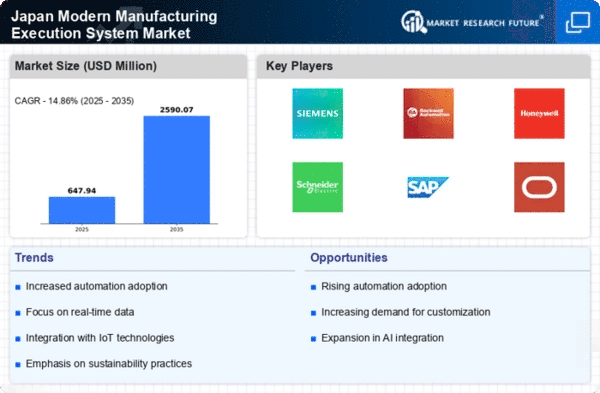Shift Towards Automation and Robotics
The shift towards automation and robotics is a key driver of the modern manufacturing-execution-system market in Japan. As manufacturers strive to improve productivity and reduce labor costs, the integration of automated systems has become increasingly prevalent. Recent statistics suggest that approximately 50% of manufacturing firms in Japan are investing in robotic process automation. This trend is likely to enhance the functionality of modern manufacturing-execution systems, as they become integral to managing automated processes. The synergy between automation and manufacturing-execution systems is expected to lead to more streamlined operations and improved production outcomes.
Increased Focus on Supply Chain Resilience
The modern manufacturing-execution-system market is also being driven by an increased focus on supply chain resilience among Japanese manufacturers. In light of recent disruptions, companies are prioritizing the need for systems that can provide greater visibility and control over their supply chains. Modern manufacturing-execution systems enable manufacturers to monitor supply chain activities in real-time, facilitating quicker responses to potential disruptions. It is estimated that around 60% of manufacturers in Japan are actively seeking solutions that enhance supply chain transparency. This trend indicates a growing recognition of the importance of robust supply chain management in maintaining operational continuity.
Rising Demand for Real-Time Data Analytics
The modern manufacturing-execution-system market in Japan is experiencing a notable surge in demand for real-time data analytics. This trend is driven by the need for manufacturers to enhance operational efficiency and decision-making processes. With the increasing complexity of manufacturing operations, companies are seeking systems that can provide immediate insights into production metrics. According to recent data, approximately 70% of manufacturers in Japan are investing in technologies that facilitate real-time data collection and analysis. This shift towards data-driven decision-making is likely to propel the adoption of modern manufacturing-execution systems, as organizations aim to optimize their production lines and reduce downtime.
Government Initiatives Supporting Industry 4.0
In Japan, government initiatives aimed at promoting Industry 4.0 are significantly influencing the modern manufacturing-execution-system market. The Japanese government has launched various programs to encourage the adoption of smart manufacturing technologies, which include modern manufacturing-execution systems. These initiatives are designed to enhance productivity and competitiveness within the manufacturing sector. For instance, the government has allocated over ¥200 billion to support digital transformation projects across industries. This financial backing is expected to stimulate investments in modern manufacturing-execution systems, as companies align with national strategies to modernize their operations and improve efficiency.
Growing Emphasis on Quality Control and Compliance
Quality control and compliance are becoming paramount in the modern manufacturing-execution-system market in Japan. Manufacturers are under increasing pressure to meet stringent quality standards and regulatory requirements. Modern manufacturing-execution systems provide the necessary tools to monitor quality metrics and ensure compliance throughout the production process. It is reported that around 65% of manufacturers are prioritizing investments in systems that enhance quality assurance capabilities. This emphasis on quality is likely to drive the adoption of modern manufacturing-execution systems, as companies seek to maintain their competitive edge in a market that demands high-quality products.
















